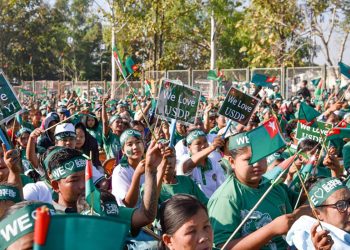Representatives of seven of Myanmar’s ethnic armed organizations (EAOs) met the new Chinese special envoy to Myanmar, Deng Xijun, in China’s Yunnan Province in the last week of December, according to the EAOs.
On Wednesday, Deng Xijun reportedly arrived in the Myanmar capital Naypyitaw after meeting the EAOs, which are all based in northern Myanmar. Neither the military regime nor Beijing have commentated on the meeting as yet.
China’s new envoy met separately with representatives of the United Wa State Army (UWSA), the Kachin Independence Army (KIA), the National Democratic Alliance Army (NDAA), the Shan State Progress Party (SSPP), the Arakan Army (AA), the Ta’ang National Liberation Army (TNLA) and the Myanmar National Democratic Alliance Army (MNDAA).
Three of the EAOs – the KIA, TNLA, and MNDAA – are actively fighting the regime. The KIA is based in Kachin State in northern Myanmar, while the TNLA and MNDAA are based in northeast Myanmar’s Shan State.
The Rakhine-based AA has been observing an informal ceasefire with the junta on humanitarian grounds since late November, after months of intense fighting.
UWSA liaison officer Nyi Rang, based in Shan State’s Lashio, told The Irrawaddy: “Yes we met with him [China’s envoy], but just to make introductions. There was no discussion on particular issues.”
Previously, Deng Xijun served as Beijing’s special envoy for Association of Southeast Asian Nations affairs from 2020 to November this year, before succeeding Sun Guoxiang as China’s special envoy to Myanmar.
SSPP secretary 2 Colonel Sai Hsu also confirmed the meeting between the EAOs and Beijing’s new envoy.
“The meeting was just to introduce ourselves. There was nothing special. The special envoy repeated that China’s policy is that it wants stability at the border and does not want to see fighting, that it is wrong to start fighting, that China does not support reciprocal fighting, that fighting is not the right solution to problems, and that China is concerned that fighting will make it more difficult to achieve internal peace. [The previous special envoy] also talked about these policies whenever he met us,” said Colonel Sai Hsu.
Deng Xijun also offered the prospect of another round of talks with the UWSA, SSPP and NDAA, added the colonel.
“[We rejected that] because it is not OK for us to meet him on the date he proposed. Our three groups want to meet him collectively and not separately. Some senior members of our ally the UWSA were not free. Some of them are Christians and they don’t travel during Christmas. That’s why [the meeting was rejected].”
After meeting the EAOs, Deng Xijun reportedly traveled to Naypyitaw to meet junta leaders.
A political observer based in Myanmar who asked for anonymity said that Beijing’s move is probably a response to the Burma Act, part of the National Defense Authorization Act (NDAA) that was recently passed by the United States Congress.
The Burma Act authorizes funds and technical assistance for anti-junta forces in Myanmar, including EAOs.
“China has done nothing regarding the Myanmar issue since Sun Guoxiang’s visit last year. China also did not urge [EAOs to join] when the military invited them to peace talks earlier this year. It has not done anything to mediate. But it has rushed to appoint an envoy, perhaps as a pre-emptive move to prepare for the consequences after the NDAA comes into force,” said the political observer.

















